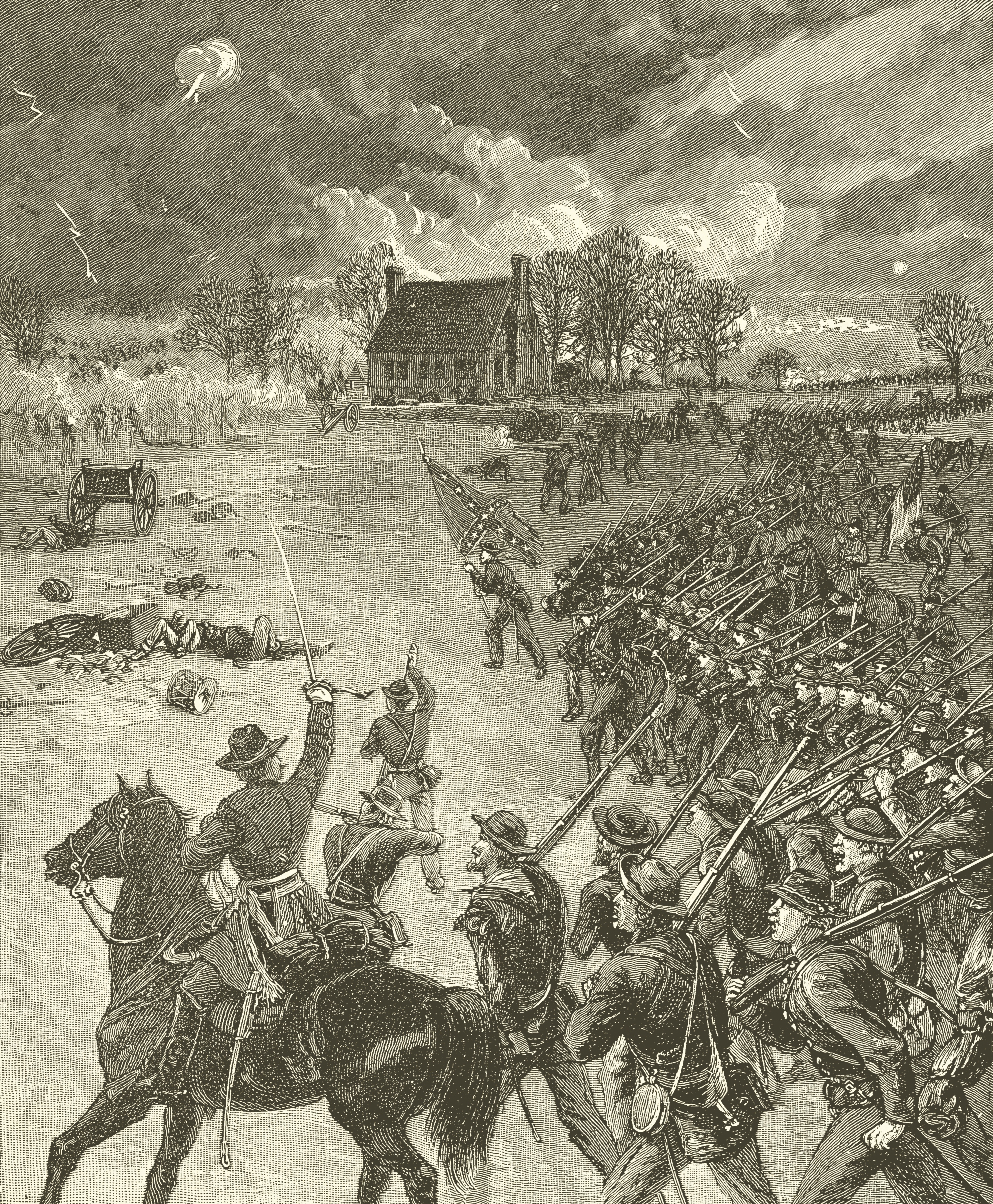Union captain Frederick Von Fritsch had a horrible day at Chancellorsville.
When I was doing research for Time-Life Books’ Voices of the Civil War series in the 1990s, I discovered the fascinating 1891 and 1901 pension requests of 11th Corps Captain Frederick Otto Von Fritsch. He wrote in detail of what he experienced during the 11th Corps’ debacle on Saturday afternoon, May 2, 1863, at Chancellorsville, and other events that year that destroyed his health.
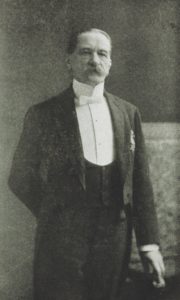
“Baron” Von Fritsch was of German aristocracy. He had been educated at the military academy in Dresden, where he became a fine horseman, athletic performer, and swordsman. After three and a half years in the 1st Royal Cavalry, he was honorably discharged and came to America in December 1856. For several years he traveled America and Mexico.
Von Fritsch joined the 68th New York Infantry on November 1, 1862, at Centreville, Va. The 68th New York was made up of Austrians, Prussians, and Bavarians from Manhattan who had served in Union Maj. Gen. John Pope’s Army of Virginia before being melded into the Army of the Potomac.
Almost from the beginning of his service, Von Fritsch was put on the staff of Brig. Gen. Alexander Schimmelfennig, sometimes spelled Schimmelpfennig, a Prussian immigrant, political activist, and friend of socialist Carl Schurz. Schimmelfennig was wounded in the 1848 German Revolutions, and later opposed the Communist leadership of Karl Marx and Friedrich Engels.
The main document in Von Fritsch’s pension addressing the Union veteran’s ailments is titled, “History of the Bodily Sufferings of Frederick Otto Von Fritsch, late Captain, Company A., 68th New York Volunteer Infantry, and Staff Officer. In consequence of Wounds, Accidents, Exposures and Hardships experienced during the great War.”
The below account is a graphic depiction of a series of accidents and bad luck for Captain Von Fritsch on May 2 at Chancellorsville. The captain dictated the account to his pension agent, hence the use of the third person. Some punctuation has been added; all bracketed additions are from additional accounts found in the pensions or for reader clarity, but nearly all is as Von Fritsch dictated on June 16, 1891.
Injury to Genital Organs and Incurable Strictures.
On May 1st, 1863, the 11th Corps was placed easily assailable and with no protection of its right flank, on the plank road and turnpike, near Chancellorsville, Virginia.
Captain F.O. Von Fritsch, detailed as Aide de Camp to General Schimmelpfennig, commanding 3rd Brigade of the 3rd Division, received the order to ride outside the Union lines to reconnoiter, about 5:30 P.M. He galloped at once towards the outposts [the 11th Corps skirmish-line, facing south from Orange Turnpike], accompanied by two orderlies. From there he rode out alone about one mile, in the direction of the visible camps of General [Stonewall] Jackson. Reaching an elevated point, he spied about with field glasses—loaned to him by Captain Renneberg, of the 68th N.Y.—and noticed wagons and troops of the confederate army moving towards the flank of our position. Trying to find out if the whole army was moving, he gave spurs and rode about a mile and half to our right, when three or four bullets whistled around his head and one ball struck his horse in the hind leg. He observed also that a troop of Fitz Lee’s rebel cavalry [from the First Virginia Cavalry] were trying to cut him off and whipping his poor horse with his sword, he [was] chased first through the woods and then over an open plain towards the Union lines. The rebel cavalry outpost was pursuing him, firing all the time. One ball struck his saddle, one the heel of his boot, one damaged his scabbard, one smashed the field glasses, and one wounded the horse in the same damaged leg. The horse—called Jim—was of a superior breed and, excited as it was, managed to get along fast enough on three legs to keep ahead of the pursuers. At once Captain Von Fritsch distinctly heard the commands of Captain Steuernegel, of the glorious 68th N.Y., commanding the outposts [a part of a company on the skirmish-line]: “Wait Boys! Wait!! Now Fire!!!”
Seven to nine bullets must have struck the horse of Captain Fritsch, many bullets whistled about the rider and the charger fell dead. Captain Von Fritsch fell with fearful force on the saddle knob and to the ground. [During the fall, Von Fritsch also hit a log and was knocked “senseless.”] ‘When I awoke I felt a severe pain near the testicles,’ said Von Fritsch. The rebels, of course, had turned and fled. Captain Von F. raised himself with great difficulty and said to Capt. Steuernagel, who stood near the road: “Why in hell did you kill my horse?” “Upon my word, I did not recognize you in the dust and thought it was a cavalry attack,” he answered.
When the dust and powder clouds passed away, Captain Von F. noticed a rebel, whose horse had been shot, running after his comrades.
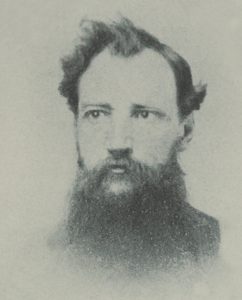
By this time his [Von Fritsch’s] orderlies came out of the woods and he ordered one on a bay horse to dismount and help him in the saddle. Captain Steuernagel stood by, and said: “You are not off again?” at the same time petting the horse on the beak; the horse kicked and damaged Capt. Steuernagel’s knee, disabling him from service.
A moment later Capt. Von F. was off like lightning; he wanted to capture the running rebel, to pump him out. When he nearly caught up with him, the fellow kneeled down and fired. The bullet struck the horse in the upper hind leg. “Surrender” the Captain halloed, but reaching for his sword, he found then he had left it when he fell from his horse Jim. Being unarmed, and the blood streaming down his horses leg, he turned and galloped back to head-quarters on the turnpike, to report.
General Schimmelpfennig, an educated soldier, but not very brave, cried out: “Take away that horse, don’t show any blood here—take him to the rear!”
Captain Von F. saluted, and said: “Lee is marching to our flank.”
“Take away that horse or I will have you arrested.”
Capt. Von F. rode off at a walk disgusted, the men cheering him.
This horse was the first wounded member of the 11th Corps, at Chancellorsville, that fell into the hands of the surgeons; they threw it down and probed for the bullet.
Captain Von F., not able to find his servant with the pack-horse, obtained an order to the Ambulance Corps for a spare horse and by this time a Sergeant came up with his [Von Fritsch’s lost] sword. Using it as a stick, Capt. Von F. [with the help of a corporal] slowly worked his way to the Ambulance Corps. Arrived there he found a strong inclination to urinate but to his horror he could not do it. A terrible pain in the genital organs was created by his efforts. He fell down groaning. Some three or four surgeons surrounded him and he stated the above facts. They partially undressed him and one of them [Von Fritsch said, “Dr. Reissberg, very much excited, as some shells bursted near us, performed the operation with careless rapidity, no doubt damaging the channel…”] passed a catheter down to the bladder, when a heavy stream of water mixed with blood came forth and relieved him greatly. Some one gave him a drink of whiskey and he sang out: “I am all right now, get me a horse!”
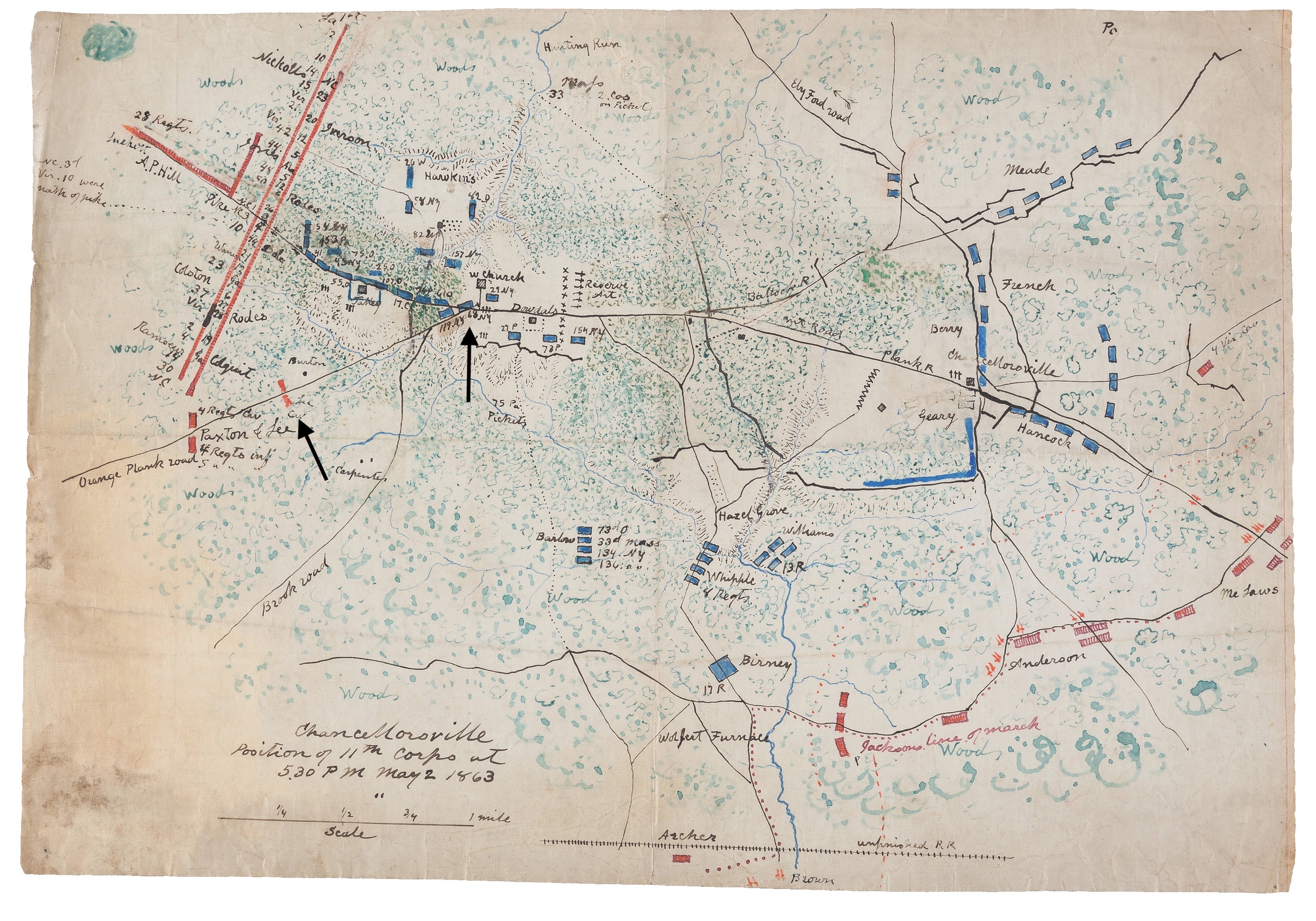
The Lieutenant in charge furnished a large, thin roan with a miserable saddle. He [Captain Von Fritsch] begged for a blanket, and folding it carefully over the saddle, mounted and reported for duty.
He reported again that Lee was marching towards our right flank, but General Schimmelpfennig ordered the men to cut down trees and barricade the [Orange Plank Road] road in front of us and nothing was done to strengthen the skirmish line on our flank.
Still, according to [Maj. Gen.] Abner Doubleday’s book about Chancellorsville, —page 29, Gen. S.[chimmelfennig] reported the hostile movement to Howard.
On May 2, when the attack took place, Captain Von F. was ordered to bring Colonel Hecker’s [82nd Illinois] Regiment to [the] cross-road[s]. “Too late!” halloed Gen. S.[chimmelfennig] when he returned, followed by it; and at that moment a ball struck Capt. Von F. in the belt plate, throwing him from his horse, weak as he was.
Colonel Meisenburg, Adjutant General of the 11th Corps, just passed by and Capt. Von Fritsch unfortunately told him, “I am killed.” (Reported in The New York Herald: Baron Von Fritsch, Aide de Camp, killed May 2nd.)
On investigation it turned out, that a round ball had struck the belt plate, passed through the leather belt, tore off a button of the uniform, passed through the clothes but did not enter the bowels. The stomach showed all colors and for some days Capt. Von F. could only speak in a whisper. He at once remounted, under a terrible fire, and worked hard to stop the panic stricken troops and tried to rally them under the flag held by [11th Corps commander Maj.] General [Oliver] Howard.
After witnessing the terrible slaughter of the rebels by gallant Captain [Hubert] Dilger’s and others batteries, on an eminence overlooking Chancellorsville, in the evening, Captain Von F. rode about trying to find his General and troops, but they had run some miles further.
Passing a cabin near [Maj. Gen. Joseph] Hooker’s head-quarters, he observed a tub and got a negro woman to make him some hot water. Taking a sit-bath he was able to urinate again, and a cup of coffee from the woman and a few hours sleep on muddy ground gave him new life.
He did hard service on May 3rd and 4th until the return to the old camp. There he procured some very thin bougies [catheters] from Washington, by a sutler, Adams, and after some lessons by Assistant Surgeon Reissberg, he managed to insert them himself.”
During the Gettysburg Campaign, Von Fritsch augmented his saddle with a feather pillow but still suffered pain from his Chancellorsville injury. During the 11th Corps’ retreat through Gettysburg on July 1, 1863, Von Fritsch managed to reach the Union lines south of town. General Schimmelfennig, however, was not so lucky, and was trapped in a backyard on Baltimore Street.
Von Fritsch’s bad luck continued on East Cemetery Hill when a Union cannon recoiled and ran over his right big toe. Regardless of his painful wounds Von Fritsch stayed in the saddle, despite repeated fainting spells and falling from his horse, during the pursuit of the Army of Northern Virginia after Gettysburg. At Berlin, Md. (modern-day Brunswick), Von Fritsch was ordered to escort the 135th Pennsylvania Infantry to Philadelphia to be mustered out, and while there he sought medical attention for his foot and genitals. His boot had to be cut off, and Doctors found an inoperable sore under his toenail. He would be lame the rest of his life. Von Fritsch later went to Bethlehem, Pa., for a warm water cure for his genital injuries.
Miraculously Von Fritsch returned to active duty in late 1863. By then, the 11th and 12th Corps of the Army of the Potomac had been combined into the 20th Corps and transferred to the Northeastern Alabama and East Tennessee area to reinforce Maj. Gen. Ulysses S. Grant’s Chattanooga Campaign. Captain Von Fritsch continued to have Dr. Reissberg, surgeon of the 68th New York, administer bougies “every Sunday morning to keep the channel open.”
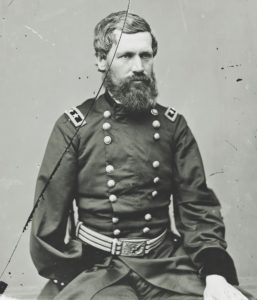
At Bridgeport, Ala., Von Fritsch helped guard a military bridge over the Tennessee River. While living in a nearby camp, he developed bronchial catarrh, chills, fever, and Rheumatism. “He coughed day and night and filled a big hole next to his field bed with greenish matter, which he had to spit out continually,” states a document in his pension file.
When his regiment left East Tennessee, it left Von Fritsch behind. A missive in his pension file explained, “It is disagreeable to say, but they left him alone in the woods with a few very sick men, and he crawled on his hands and knees to the railroad station and was lifted in an empty freight car. With much trouble he reached a hotel in Nashville and got a warm room. This change worked wonders, in a week he would leave the bed, and a kind sutler drove him to the hospital. There he soon recovered. Ordered back to his command, he waited for the 20th Corps two weeks in the same woods, near a Commissary who refused him shelter. The cough returned and finally developed itself into chronic catarrh, of which he suffers to this date [June 16, 1891], in spite of having used all known remedies. He catches cold frequently as a result of it, and suffers often from throat troubles.”
And his Chancellorsville injury also plagued him. In 1868 Von Fritsch could only urinate by sitting in hot water because of his severe wound. He visited Leipzig, Germany, to consult a specialist but found little relief. In 1885 he returned to Dresden for an operation, and after terrible suffering he became better.
In his June 1901 letter to the pension office Von Fritsch, living in Manhattan, stated, “So I claim, that accidents and hardships of 3 years and 2 months service during the War have made me a sufferer of a very severe stricture, Rheumatism, Chronic Catharrh, creating blindness, besides very bad piles and a sore toe. My life was ruined mostly by the stricture, as it prevented me from marrying, and I had to give this explanation to the mother of a young lady, worth millions, who was determined to secure me as a husband.” In the same letter he hoped, “to fall in soon for the last Roll Call.”
The conclusion of the pension sums up the long-lasting feeling Frederick Otto Von Fritsch had toward Oliver Howard, the former 11th Corps commander at Chancellorsville. Von Fritsch was invited to a November 2, 1901, banquet at the Waldorf Astoria in honor of General Howard. In a reply sent on November 15, 1901, Von Fritsch explained why he could not attend:
To Colonel H.H. Adams,
New York,
Dear Companion:
Your kind invitation has been received, and while I love to meet old Comrades on such occasions, I am obliged to send my regrets for the following reasons: General Howard, while commanding the 11th Corps at the terrible battle of Chancellorsville could have saved this gallant Corps and turned defeat into glorious victory, had he given credit to reports made by immortal Captain Dilger of the Ohio battery and by myself, as Aide de Camp to General Schimmelpfennig, at 3:15 P.M. on May 2, 1863. We both reported after a most daring Reconnoitering ride far outside our wrongly placed line, that the enemy was marching to our flank and that a total change of position was necessary. I had been fired at by Infantry and Cavalry and a confederate outpost had chased me close to our lines, that Captain Steuernagel of the 68th Regt. N. Y. Vols. ordered his sharpshooters [skirmish line] to fire at us, killing my horse by many balls, and dismounting three or four Rebel Cavalrymen who then fled. I was badly damaged by the fall of my horse but reporting on another horse soon after, I was told that I was mistaken, and that the enemy was retiring.
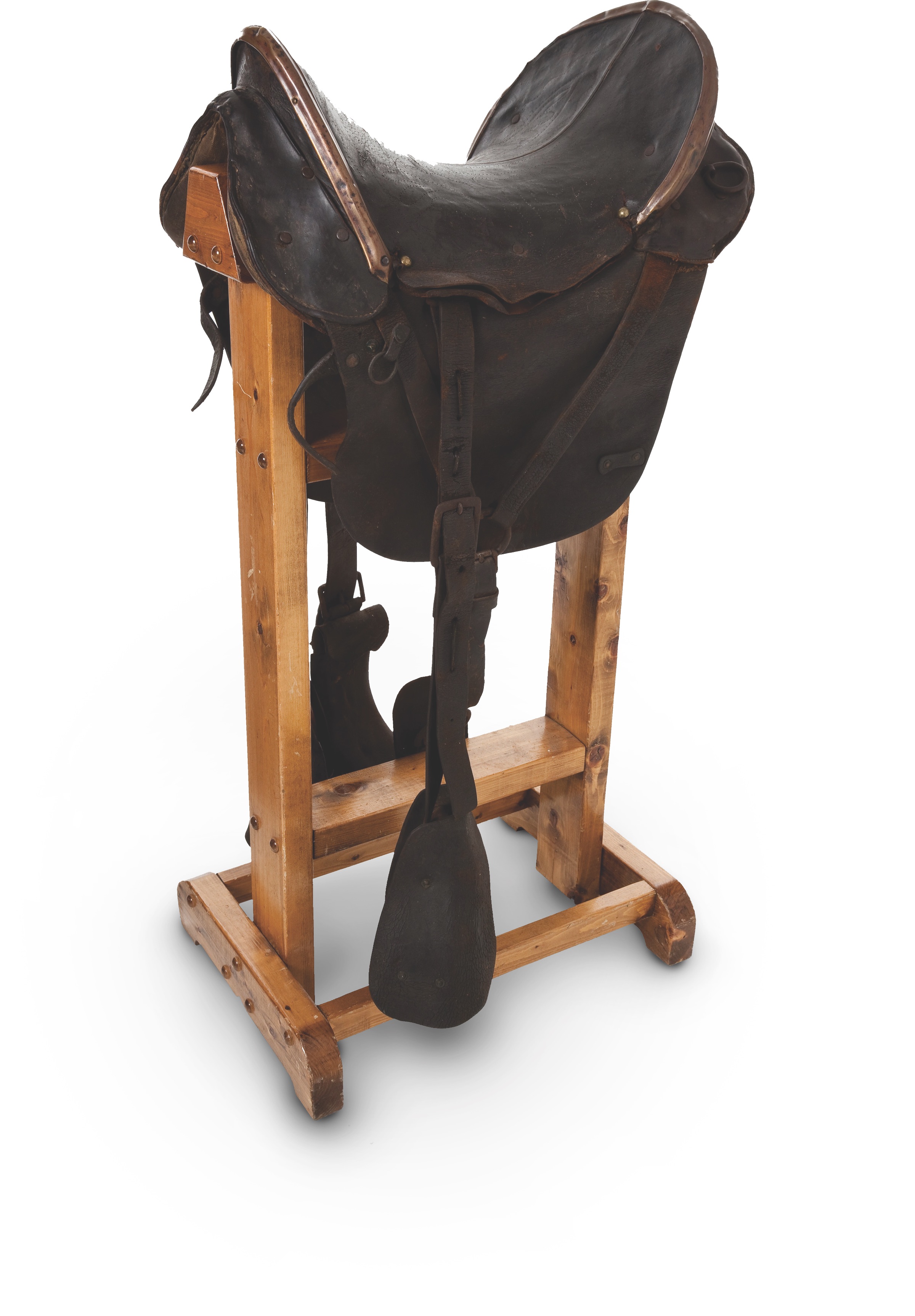
The second reason is, that, when soon after 5 P. M. the furious attack on our flank took place and General Howard jumped or fell from his horse on the well known Cross-roads, I caught the frightened animal and assisted the General to mount against his protest, enabling him to gallop to the rear from the spot, where hundreds were killed at that very moment, and when batteries without drivers came chasing right in the midst of our brave soldiers, who hardly knew which way to turn and to fire.
In his official report General Howard stated that some kind Orderly helped him in the saddle, and thus deprived Captain Frederick Otto Von Fritsch of the honor having saved, most probably, his life. I only know that a minute later I got shot in my belt plate, that a bullet destroyed my spy-glasses, another tore away my heel of one of my boots and two balls entered the legs of my charger.
For the above reasons you cannot expect me, dear Colonel, to attend a Banquet in honor of General Howard, although I know that he served afterwards with great distinction and received even the thanks of Congress.
Very truly Yours,
Companion Von Fritsch”
Robert Lee Hodge is an Emmy Award–winning filmmaker and preservationist who has organized events that have garnered over $175,000 for battlefield preservation. He has been featured in The New York Times, Preservation Magazine, and appeared on PBS, as well as in many other publications and television appearances. He can be reached at robertleehodge@yahoo.com.

